行为动词一般现在时
- 格式:ppt
- 大小:302.50 KB
- 文档页数:10
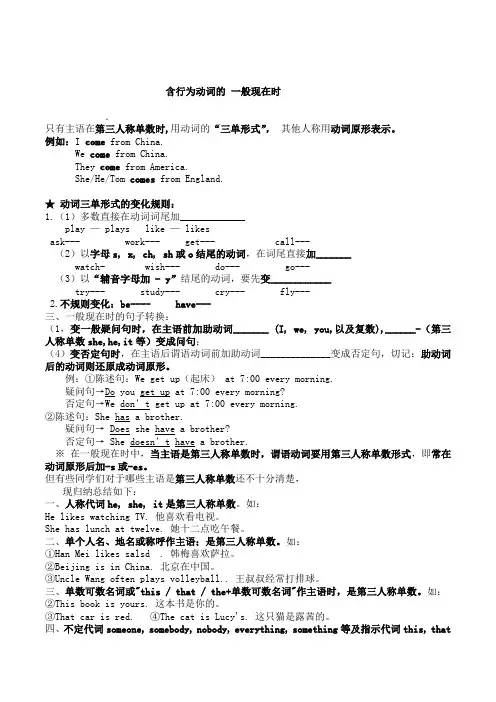
含行为动词的一般现在时.只有主语在第三人称单数时,用动词的“三单形式”,其他人称用动词原形表示。
例如:I come from China.We come from China.They come from America.She/He/Tom comes from England.★动词三单形式的变化规则:1.(1)多数直接在动词词尾加_____________play — plays like — likesask--- work--- get--- call---(2)以字母s, x, ch, sh或o结尾的动词,在词尾直接加_______watch- wish--- do--- go---(3)以“辅音字母加 - y”结尾的动词,要先变____________try--- study--- cry--- fly---2.不规则变化:be---- have---三、一般现在时的句子转换:(1,变一般疑问句时,在主语前加助动词_______ (I, we, you,以及复数),______-(第三人称单数she,he,it等)变成问句;(4)变否定句时,在主语后谓语动词前加助动词______________变成否定句,切记:助动词后的动词则还原成动词原形。
例:①陈述句:We get up(起床) at 7:00 every morning.疑问句→Do you get up at 7:00 every morning?否定句→We don’t get up at 7:00 every morning.②陈述句:She has a brother.疑问句→ Does she have a brother?否定句→ She doesn’t have a brother.※在一般现在时中,当主语是第三人称单数时,谓语动词要用第三人称单数形式,即常在动词原形后加-s或-es。
但有些同学们对于哪些主语是第三人称单数还不十分清楚,现归纳总结如下:一、人称代词he, she, it是第三人称单数。
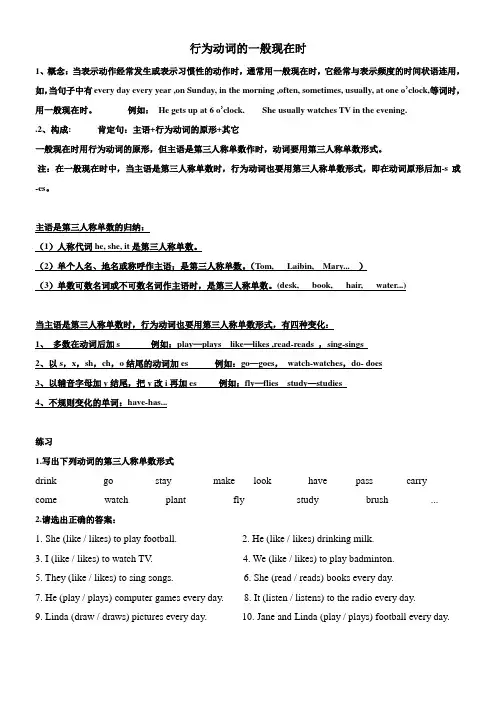
行为动词的一般现在时1、概念:当表示动作经常发生或表示习惯性的动作时,通常用一般现在时,它经常与表示频度的时间状语连用,如,当句子中有every day every year ,on Sunday, in the morning ,often, sometimes, usually, at one o’clock,等词时,用一般现在时。
例如:He gets up at 6 o’clock. She usually watches TV in the evening..2、构成: 肯定句:主语+行为动词的原形+其它一般现在时用行为动词的原形,但主语是第三人称单数作时,动词要用第三人称单数形式。
注:在一般现在时中,当主语是第三人称单数时,行为动词也要用第三人称单数形式,即在动词原形后加-s或-es。
主语是第三人称单数的归纳:(1)人称代词he, she, it是第三人称单数。
(2)单个人名、地名或称呼作主语;是第三人称单数。
(Tom, Laibin, Mary... )(3)单数可数名词或不可数名词作主语时,是第三人称单数。
(desk, book, hair, water...)当主语是第三人称单数时,行为动词也要用第三人称单数形式,有四种变化:1、多数在动词后加s例如:play—plays like—likes ,read-reads ,sing-sings2、以s,x,sh,ch,o结尾的动词加es例如:go—goes,watch-watches,do- does3、以辅音字母加y结尾,把y改i再加es例如:fly—flies study—studies4、不规则变化的单词:have-has...练习1.写出下列动词的第三人称单数形式drink ________ go _______ stay _______ make ___look ______ have_____ pass______ carry ______ come_________ watch_______ plant_________ fly __________study_________ brush________ ...2.请选出正确的答案:1. She (like / likes) to play football.2. He (like / likes) drinking milk.3. I (like / likes) to watch TV.4. We (like / likes) to play badminton.5. They (like / likes) to sing songs.6. She (read / reads) books every day.7. He (play / plays) computer games every day. 8. It (listen / listens) to the radio every day.9. Linda (draw / draws) pictures every day. 10. Jane and Linda (play / plays) football every day.行为动词的一般现在时1.肯定句:主语+行为动词的原形+其它当主语是第三人称单数时,行为动词也要用第三人称单数形式,2.否定句:主语+don’t( doesn’t ) +动词原形+其它如:①I like bread. 否定句:I don’t like bread. ②We eat fish . 否定句:We don’t eat fish. 当主语为第三人称单数时,要用doesn’t构成否定句。

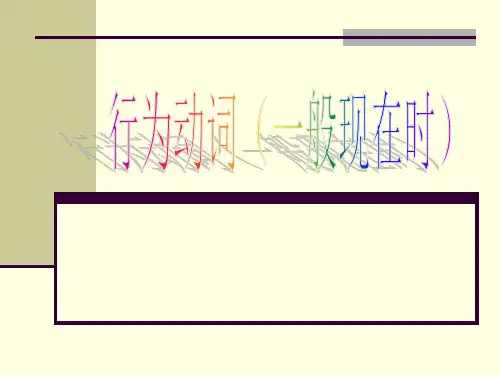
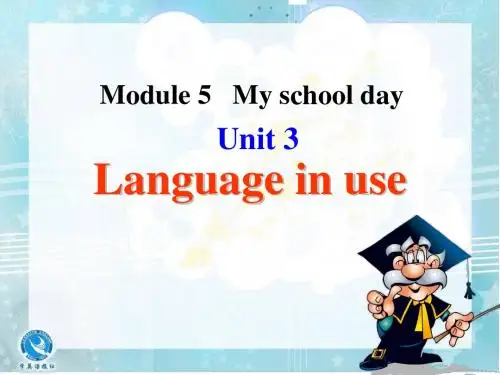
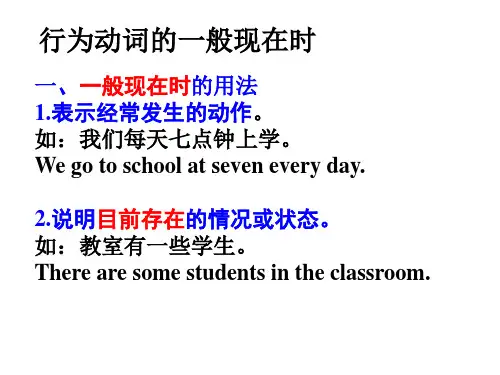
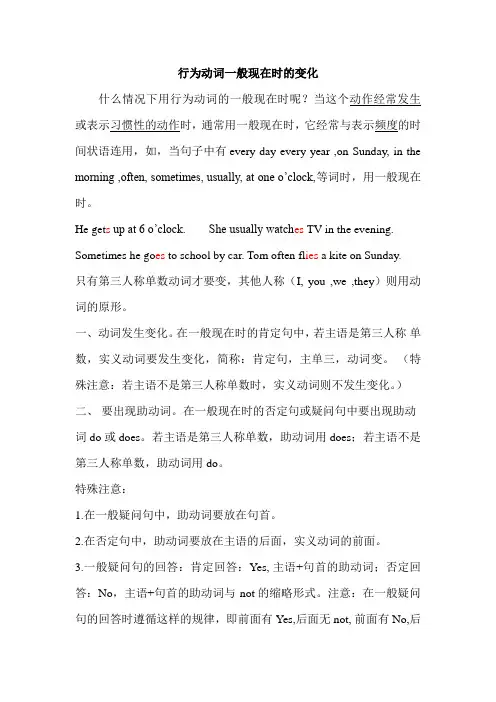
行为动词一般现在时的变化什么情况下用行为动词的一般现在时呢?当这个动作经常发生或表示习惯性的动作时,通常用一般现在时,它经常与表示频度的时间状语连用,如,当句子中有every day every year ,on Sunday, in the morning ,often, sometimes, usually, at one o’clock,等词时,用一般现在时。
He get s up at 6 o’clock. She usually watch es TV in the evening. Sometimes he go es to school by car. Tom often fl ies a kite on Sunday.只有第三人称单数动词才要变,其他人称(I, you ,we ,they)则用动词的原形。
一、动词发生变化。
在一般现在时的肯定句中,若主语是第三人称单数,实义动词要发生变化,简称:肯定句,主单三,动词变。
(特殊注意:若主语不是第三人称单数时,实义动词则不发生变化。
)二、要出现助动词。
在一般现在时的否定句或疑问句中要出现助动词do或does。
若主语是第三人称单数,助动词用does;若主语不是第三人称单数,助动词用do。
特殊注意:1.在一般疑问句中,助动词要放在句首。
2.在否定句中,助动词要放在主语的后面,实义动词的前面。
3.一般疑问句的回答:肯定回答:Yes, 主语+句首的助动词;否定回答:No,主语+句首的助动词与not 的缩略形式。
注意:在一般疑问句的回答时遵循这样的规律,即前面有Yes,后面无not, 前面有No,后面要有not。
这里所说的行为动词,指的是除be动词、情态动词和助动词之外的全部动词。
主语为第三人称单数he, she, it时,词形有变化。
当主语是第三人称单数时,行为动词的一般现在时通常有三种变化:1、多数在动词后加s play—play s like—like s ,read-read s sing-sing s2、以s,x,sh,ch,o结尾的动词加es go—go es wash--wash es, catch-catch es2、以辅音字母加y结尾,把y改i再加es fly—fl ies study—stud iestry-tr ies (这种变化与名词的单数变复数有点相像)写出下列动词的正确形式:1、I (go) to school at seven in the morning.2. Mike ( do) his homework at eight in the evening.3. His father often ( read) books in the library on Saturday.4. you often (study ) after school ?Yes , I do.5. Mike and Tom usually (fly ) kites on Sunday.6. She (go ) to school by bus every day.7.We usually (listen ) to the radio in the morning.8. he usually (listen ) to the music at home?No, he . 1.We often _(play) in the playground.9. What (do)—— he usually (do)—— after school?10. ______ they ________(like) the World Cup?11. ——Mike ——(read) English every day?12. How many lessons ---your classmate___(have) on Monday?13. What time _his mother -- (do) the housework?14. We _______(not watch) TV on Monday.15. Nick _______(not go) to the zoo on Sunday.写出下列动词的第三人称单数drink ______ go _____ stay _____ make ___look ____ have___ pass___ carry ____ come_______ watch_____ plant_______ fly ______study___ brush______改写句子1. Do you often play football after school? (肯定回答)2. I have many books. (改为否定句)3. Gao Shan’s sister likes playing table tennis (改为否定句4. She lives in a small town near New York.(改为一般疑问句)5. I watch TV every day. (改为一般疑问句)改错(划出错误的地方,将正确的写在横线上)1. Is your brother speak English? __________________2. Does he likes going fishing? __________________3. He likes play games after class. __________________4. Mr. Wu teachs us English. __________________5. She don’t do her homework on Sundays. ______________。

行为动词的一般现在时一、行为动词指的是除be动词、情态动词和助动词之外的全部动词。
二、当句子使用一般现在时、主语为第三人称单数he,she,it时,作为谓语的行为动词需加“-s”。
三、什么情况下用行为动词的一般现在时呢?当这个动作经常发生或表示习惯性的动作时,通常用一般现在时,它经常与表示频度的时间状语连用。
例如:当句子中有every day,every year,on Sunday,in the morning,often,sometimes,usually等词时,我们通常用一般现在时。
例如:1. get up at six c 'clock every day.我每天早上6点起床。
2. He usually gets up at nine o'clock on Sundays.他周日通常9点起床。
3.She often smokes.她经常抽烟。
4. I phone my parents once a week.我每周给父母打一次电话。
四、行为动词的一般现在时还可以用来表达客观真理和科学事实。
例如1. Three and four makes seven.3加4等于7。
2. The earth moves around the sun.地球绕着太阳转。
3. Shenyang lies in the north of China.沈阳位于中国的北部。
五、行为动词一般现在时的常用句型:1.肯定句,主语+动词(注意人称变化)+…。
例如:1)I have a dog.我有一只狗。
2) We like that little cat.我们喜欢那只小猫。
3) She sings well.她歌唱得很好。
2.否定句,主语+助动词( (do/ does)+not+动词原形+…例如:1) He doesn't have a dog.他没有狗。
2) We don't like that little cat.我们不喜欢那只小猫。
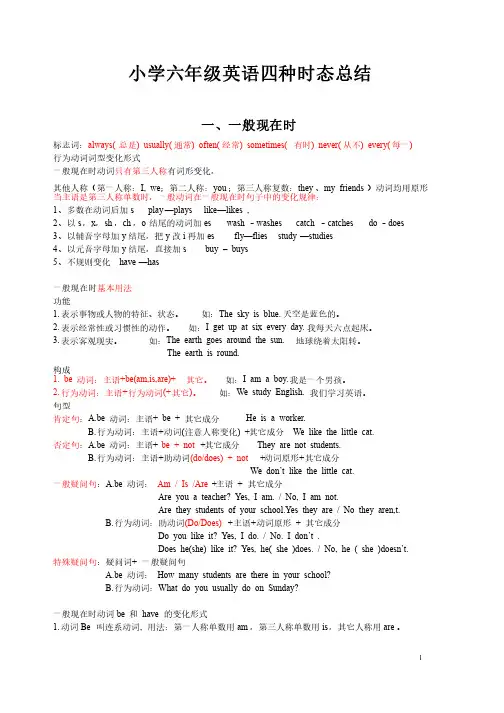
小学六年级英语四种时态总结一、一般现在时标志词:always(总是) usually(通常) often(经常) sometimes(有时) never(从不) every(每一)行为动词词型变化形式行为动词词型变化形式一般现在时动词一般现在时动词只有第三人称只有第三人称有词形变化,有词形变化, 其他人称(第一人称:I, we ;第二人称:you ;第三人称复数:they 、my friends )动词均用原形)动词均用原形 当主语是第三人称单数时,一般动词在一般现在时句子中的变化规律: 1、多数在动词后加s play —plays like like——likes , 2、以s ,x ,sh ,ch ,o 结尾的动词加es wash –washes catch –catches do –does 3、以辅音字母加y 结尾,把y 改i 再加es fly fly——flies study —studies 4、以元音字母加y 结尾,直接加s buy buy –– buys 5、不规则变化、不规则变化 have —has 一般现在时一般现在时基本用法基本用法 功能功能1.表示事物或人物的特征、状态。
表示事物或人物的特征、状态。
如:The sky is blue.天空是蓝色的。
天空是蓝色的。
2.表示经常性或习惯性的动作。
表示经常性或习惯性的动作。
如:I get up at six every day.我每天六点起床。
我每天六点起床。
3.表示客观现实。
表示客观现实。
如:The earth goes around the sun.地球绕着太阳转。
地球绕着太阳转。
The earth is round. 构成构成1. be 动词:主语+be(am,is,are)+其它。
如:I am a boy.我是一个男孩。
我是一个男孩。
2.行为动词:主语+行为动词(+其它)。
如:We study English.我们学习英语。
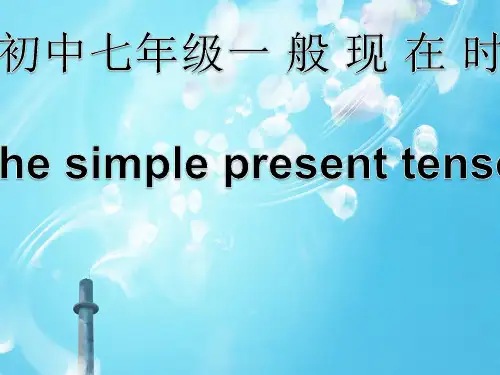
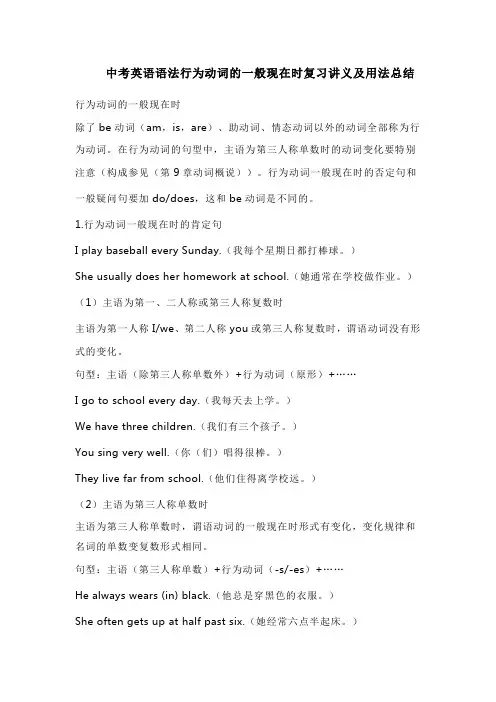
中考英语语法行为动词的一般现在时复习讲义及用法总结行为动词的一般现在时除了be动词(am,is,are)、助动词、情态动词以外的动词全部称为行为动词。
在行为动词的句型中,主语为第三人称单数时的动词变化要特别注意(构成参见(第9章动词概说))。
行为动词一般现在时的否定句和一般疑问句要加do/does,这和be动词是不同的。
1.行为动词一般现在时的肯定句I play baseball every Sunday.(我每个星期日都打棒球。
)She usually does her homework at school.(她通常在学校做作业。
)(1)主语为第一、二人称或第三人称复数时主语为第一人称I/we、第二人称you或第三人称复数时,谓语动词没有形式的变化。
句型:主语(除第三人称单数外)+行为动词(原形)+……I go to school every day.(我每天去上学。
)We have three children.(我们有三个孩子。
)You sing very well.(你(们)唱得很棒。
)They live far from school.(他们住得离学校远。
)(2)主语为第三人称单数时主语为第三人称单数时,谓语动词的一般现在时形式有变化,变化规律和名词的单数变复数形式相同。
句型:主语(第三人称单数)+行为动词(-s/-es)+……He always wears (in) black.(他总是穿黑色的衣服。
)She often gets up at half past six.(她经常六点半起床。
)Who(主语)looks after(谓语)the baby?(谁照看这个婴儿?)(2)特殊疑问句的回答特殊疑问句不能用yes/no回答。
由于在问句中出现do/does,所以动词保持原形,但回答时,动词要视主语而决定是否加-s等。
A:Where does her father work?(她父亲在哪儿工作?)B:He works in an iron factory.(他在一家铁制品厂工作。
小学P E P英语四种时态总结一、一般现在时标志词:always(总是)usually(通常)often(经常)sometimes(有时)never(从不)every(每一)行为动词词型变化形式一般现在时动词只有第三人称后有词形变化,其他人称(第一人称:I,we;第二人称:you;第三人称复数:they、myfriends)动词均用原形当主语是第三人称单数时,一般动词在一般现在时句子中的变化规律:1、多数在动词后加s play—plays like—likes,2、以s,x,sh,ch,o结尾的动词加es wash–washescatch–catchesdo–does3、以辅音字母加y结尾,把y改i再加es fly—flies study—studies4、以元音字母加y结尾,直接加sbuy–buys5、不规则变化have—has一般现在时基本用法功能1.表示事物或人物的特征、状态。
如:Theskyisblue.天空是蓝色的。
2.表示经常性或习惯性的动作。
如:Igetupatsixeveryday.我每天六点起床。
3.表示客观现实。
如:Theearthgoesaroundthesun.地球绕着太阳转。
Theearthisround.构成1.be动词:主语+be(am,is,are)+其它。
如:Iamaboy.我是一个男孩。
2.行为动词:主语+行为动词(+其它)。
如:WestudyEnglish.我们学习英语。
句型肯定句:A.be动词:主语+be+其它成分Heisaworker.B.行为动词:主语+动词(注意人称变化)+其它成分Welikethelittlecat.否定句:A.be动词:主语+be+not+其它成分Theyarenotstudents.B.行为动词:主语+助动词(do/does)+not+动词原形+其它成分Wedon’tlikethelittlecat.一般疑问句:A.be动词:Am/Is/Are+主语+其它成分Areyouateacher?Yes,Iam./No,Iamnot.Aretheystudentsofyourschool.Yestheyare/Notheyaren,t.B.行为动词:助动词(Do/Does)+主语+动词原形+其它成分Doyoulikeit?Yes,Ido./No.Idon’t.Doeshe(she)likeit?Yes,he(she)does./No,he(she)doesn’t.特殊疑问句:疑问词+一般疑问句A.be动词:Howmanystudentsarethereinyourschool?B.行为动词:WhatdoyouusuallydoonSunday?一般现在时动词be和have的变化形式1.动词Be叫连系动词,用法:第一人称单数用am,第三人称单数用is,其它人称用are。
02 行为动词的一般现在时第一部分行为动词的一般现在时的用法教材原句①Millie gets up at 6 :30 every morning.米莉每天早上六点半起床。
②They do not like sports.他们不喜欢运动。
③-Does he like sports? 他喜欢运动吗?Yes, he does./ he does not.是的,他喜欢。
/不,他不喜欢。
1.概述一般现在时表示经常性或习惯性的动作、目前的爱好、能力等以及不受时限的客观事实。
这时我们常使用行为动词。
一般现在时常与always ,often,usually,sometimes,seldom, never等频度副词或every morning/ evening/ day/week/year,in the morning/afternoon/ evening等时间状语连用。
I come from China.我来自中国。
2.基本用法①经常性、习惯性的动作:这个动作经常发生,而不是具体的某一次。
He goes to school at 7 :00 every morning.他每天早上七点去上学。
②不受时限的客观事实:有些动作或状态是永恒的。
The earth goes around the sun.地球绕着太阳转。
③目前的爱好或能力。
Simon likes playing football. 西蒙喜欢踢足球。
3.行为动词的一般现在时的人称和数根据主语的人称和数的不同,行为动词的一般现在时有两种形式。
①当主语是第一人称、第二人称或者是第三人称复数时,行为动词用动词原形。
I like apples. 我喜欢苹果。
You have breakfast at home.你在家里吃早饭。
They play football every week.他们每周踢足球。
②当主语是第三人称单数的时候,行为动词也要用第三人称单数形式。
She does her homework in the evening她晚上做家庭作业。
初中英语八种时态归纳复习一、一般现在时:概念:经常、反复发生的动作或行为及现在的某种状况。
时间状语:always, usually, often, sometimes, every week (day, year, month…), once a week, on Sundays, etc.基本结构:①be动词;②行为动词1.含be动词的一般现在时:一般现在时的句子中,be动词有三种形式:am,is和are。
它们在人称和数上与主语保持一致。
I am eleven years old. 我11岁了。
You are good at swimming. 你擅长游泳。
Tom is from Shanghai. 汤姆来自上海。
含有动词be(am,is,are)的一般现在时句子的句型变化:①否定句:主语+be+not+其他。
(is not=isn't,are not=aren't)②一般疑问句:Be+主语+其他?③特殊疑问句:特殊疑问词+一般疑问句?I am not in Class 1.我不在一班。
Are you Sandy?你是桑迪吗?Where are they from?他们来自哪儿?2. 含行为动词的一般现在时:(1)含行为动词的一般现在时,当句子主语是第三人称单数时,谓语动词也应使用第三人称单数形式,其他情况用动词原形。
I often get up at six in the morning.我经常在早上6点起床。
(2)当一般现在时句子的谓语是行为动词时,其否定结构为:主语+d on’t/doesn’t+动词原形+其他,当主语为第三人称单数时用doesn't。
一般疑问句:Do/Does+主语+动词原形+其他?,当主语为第三人称单数时用does。
特殊疑问句:特殊疑问词+一般疑问句?They don't play foothball after school.他们放学后不踢足球。
行为动词一般现在时的变化珠村小学邓惠芳这里所说的行为动词,指的是除be动词、情态动词和助动词之外的全部动词。
行为动词为数众多,主语为第三人称单数he, she, it时,词形有变化。
当主语是第三人称单数时,行为动词的一般现在时通常有三种变化:1、多数在动词后加s play—play s like—like s ,read-read ssing-sing s dance-dance s cook- cook s look- look s2、以s,x,sh,ch,o结尾的动词加es go—go es wash--wash es,watch-watch es catch-catch es do- do es3、以辅音字母加y结尾,把y改i再加es fly—fl iesstudy—stud ies try-tr ies(这种变化与名词的单数变复数有点相像)那么,什么情况下用行为动词的一般现在时呢?当这个动作经常发生或表示习惯性的动作时,通常用一般现在时,它经常与表示频度的时间状语连用,如,当句子中有every day every year ,on Sunday, in the morning ,often, sometimes, usually, at one o’clock,等词时,用一般现在时。
He get s up at 6 o’clock. She usually watch es TV in the evening. Sometimes he go es to school by car. Tom often fl ies a kite on Sunday.只有第三人称单数动词才要变,其他人称(I, you ,we ,they)则用动词的原形。
行为动词的一般现在时练习题班级姓名座号写出下列动词的正确形式:1、I (go) to school at seven in the morning.2. Mike ( do) his homework at eight in the evening.3. His father often ( read) books in the library on Saturday.4.My mother usually (watch) TV plays at home.5. My cousin sometimes (play ) cards with me.6. you often (study ) after school ?Yes ,I do.7. Mike and Tom usually (fly ) kites on Sunday.8. They (go) to school by bus every day.9. She (go ) to school by bus every day.10.We usually (listen ) to the radio in the morning.11. He usually (listen ) to the radio in the morning.12. he usually (listen ) to the music at home?No, he .。